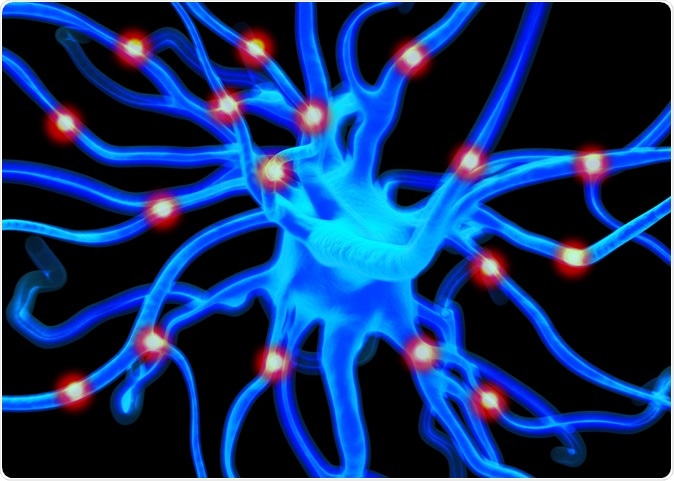According to a new study, a brain intervention could stop a perverse desire to be physically or sexually violent in some individuals.

Neuron or nerve cells which form part of the nervous system which process and transmit information by electrical and chemical signalling. Image Credit: royaltystockphoto.com / Shutterstock
Researchers at the University of Pennsylvania and Nanyang Tech University experimented with a stimulation technique of the brain where they targeted the prefrontal cortex. This part of the brain is responsible for complex thought as well as decision making process. Stimulating the region, they noted that violent tendencies could be curbed. The study results were published this week in the latest issue of the J Neuroscience journal. The study was titled, “Stimulation of the Prefrontal Cortex Reduces Intentions to Commit Aggression: A Randomized, Double-Blind, Placebo-Controlled, Stratified, Parallel-Group Trial”.
There have been studies that have shown that some individuals who have violent tendencies have certain deficits in their prefrontal cortex. This experiment meant to see the effect stimulation of this region would have on the brain of people. For this study 81 healthy adults were recruited in Philadelphia. They were randomly divided into two groups. One half of the group were administered a minimally invasive technique called transcranial direct-current stimulation. In this technique they were given a painless electrical current to their prefrontal cortex for 20 minutes. The other group did not get the stimulation but was given a low current for 30 seconds. None of the participants knew if they were receiving the actual stimulation or the low 30 second placebo current.
Thereafter all the participants were exposed to two hypothetical scenarios. The first one is of a physical assault. A person has taken his girlfriend of two years on a dinner date. As he leaves for the bathroom, he returns to find a friend of his chatting with his girlfriend. The scene ends up in a heated argument between the two men and the boyfriend hits the other man on his head with a beer bottle. The second scenario is that of a sexual assault. A couple are on a first date watching a movie at the woman’s house. They start kissing during the movie and when the woman asks the man to stop, he sexually assaults her despite her protests.
All participants were now asked to rate on a scale of 0 to 10 the likelihood of their ever acting like the violent protagonists in the scenarios. On the scale 0 meant no chance while 10 meant a 100 percent chance. Among persons who had had the brain stimulation, the likelihood of ever considering physical or sexual assault was 47 and 70 percent lower respectively compared to those who had not received the brain stimulation.
Study co-author Adrian Raine, a psychologist and a Penn Integrates Knowledge professor, in his statement said, “Much of the focus in understanding causes of crime has been on social causation. That's important, but research from brain imaging and genetics has also shown that half of the variance in violence can be chalked up to biological factors. We're trying to find benign biological interventions that society will accept, and transcranial direct-current stimulation is minimal risk. This isn't a frontal lobotomy. In fact, we're saying the opposite - that the front part of the brain needs to be better connected to the rest of the brain.”
The study authors add in their work that this study involved only healthy individuals and the effects of this stimulation on individuals prone to violence remains to be seen. They also write that this experiment does not imply that all violence may go away. More research would be necessary to see if it actually works in the real world scenario say the researchers and experts.
Study co-author Dr. Roy Hamilton an associate professor of neurology at Penn's Perelman School of Medicine said however that this study is encouraging and explained, “The ability to manipulate such complex and fundamental aspects of cognition and behavior from outside the body has tremendous social, ethical and possibly someday legal implications. Perhaps, the secret to holding less violence in your heart is to have a properly stimulated mind.”
Source:
http://www.jneurosci.org/content/early/2018/07/02/JNEUROSCI.3317-17.2018